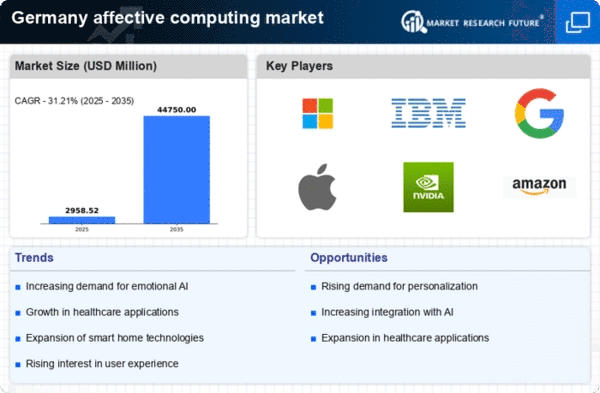Technological Advancements in AI
The rapid evolution of artificial intelligence (AI) technologies is a primary driver for the affective computing market in Germany. Innovations in machine learning and natural language processing enable systems to better understand and interpret human emotions. This capability is increasingly being integrated into various applications, including customer service and mental health support. The market for AI in Germany is projected to reach €20 billion by 2025, indicating a robust growth trajectory. As businesses recognize the value of emotional intelligence in enhancing user experience, the demand for affective computing solutions is likely to surge. This trend suggests that companies investing in AI-driven emotional analytics will gain a competitive edge, thereby propelling the affective computing market forward.
Expansion of Smart Devices and IoT
The proliferation of smart devices and the Internet of Things (IoT) in Germany is a crucial driver for the affective computing market. As more devices become interconnected, the potential for collecting and analyzing emotional data increases significantly. Smart home devices, wearables, and mobile applications are increasingly incorporating affective computing capabilities to enhance user interaction. The IoT market in Germany is projected to reach €30 billion by 2025, suggesting a substantial opportunity for affective computing technologies. This expansion allows for real-time emotional analysis, enabling businesses to respond proactively to user needs. Consequently, the integration of affective computing in IoT devices is likely to foster greater emotional connectivity between users and technology, driving market growth.
Increased Focus on User-Centric Design
User-centric design principles are becoming increasingly prevalent in the development of technology products in Germany. This focus on user experience is a significant driver for the affective computing market, as companies strive to create solutions that resonate emotionally with users. By integrating affective computing technologies, businesses can gather insights into user emotions and preferences, leading to more intuitive and engaging products. The demand for user-centric applications is projected to grow by 12% annually, indicating a strong market potential. As organizations prioritize emotional engagement in their design processes, the affective computing market is likely to expand, offering innovative solutions that enhance user satisfaction and loyalty.
Growing Demand for Personalized Experiences
In Germany, there is a notable shift towards personalized experiences across various sectors, including retail, entertainment, and healthcare. Consumers increasingly expect services tailored to their emotional and psychological needs. This trend is driving the affective computing market, as businesses seek to leverage emotional data to enhance customer engagement. For instance, the retail sector is utilizing affective computing to analyze customer emotions during shopping, leading to improved product recommendations and customer satisfaction. The potential market size for personalized services in Germany is estimated to grow by 15% annually, highlighting the increasing importance of emotional insights in business strategies. Consequently, companies that harness affective computing technologies are likely to see significant benefits in customer loyalty and retention.
Regulatory Support for Mental Health Technologies
The German government has been actively promoting mental health initiatives, which indirectly supports the affective computing market. Recent policies aimed at improving mental health services have led to increased funding for technologies that can assist in emotional well-being. For example, the introduction of digital health applications has created a favorable environment for affective computing solutions that monitor and analyze emotional states. The market for mental health technologies in Germany is expected to reach €5 billion by 2026, driven by the need for innovative solutions. This regulatory support not only encourages the development of affective computing applications but also fosters collaboration between tech companies and healthcare providers, further enhancing the market's growth prospects.
















